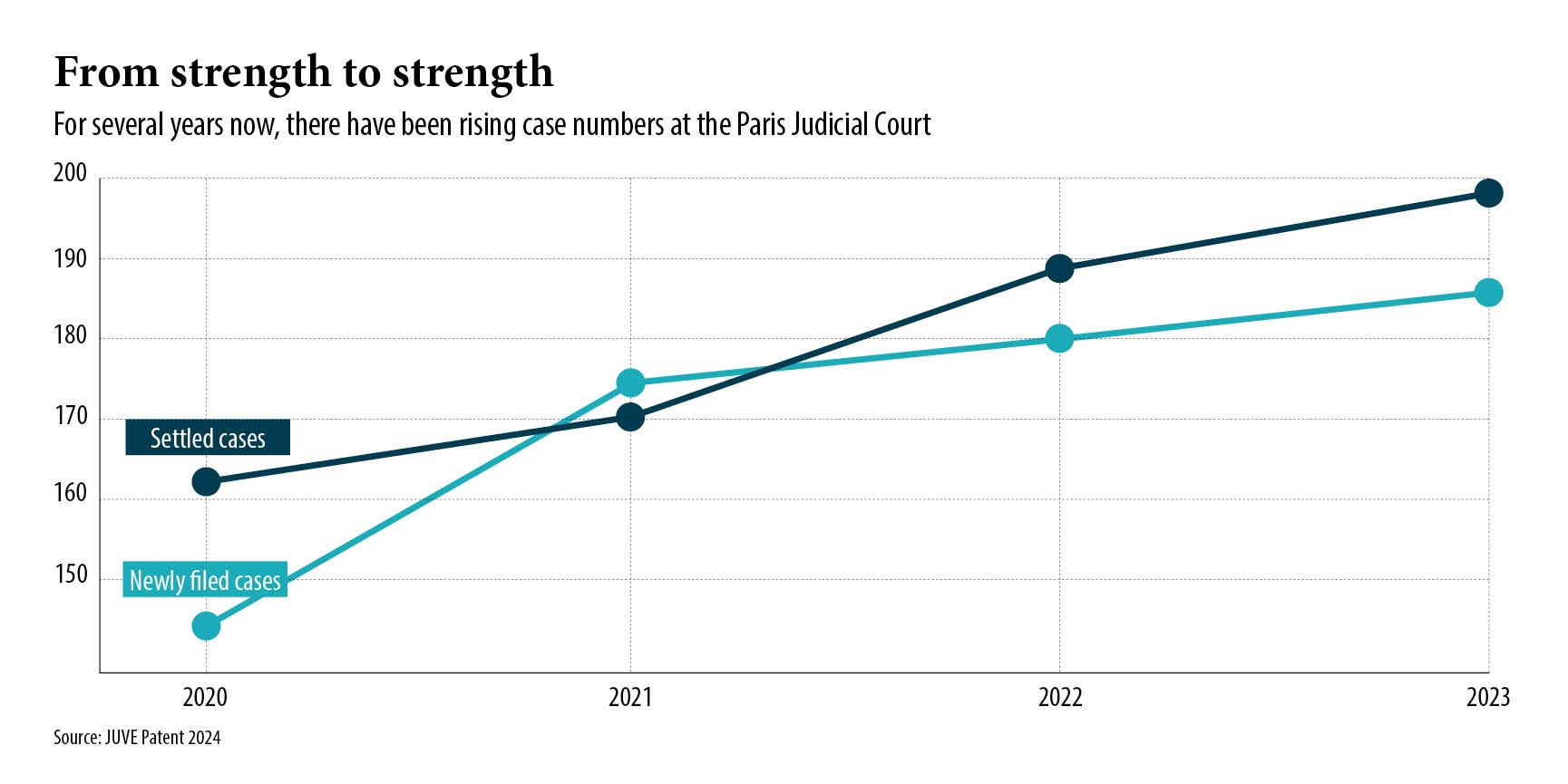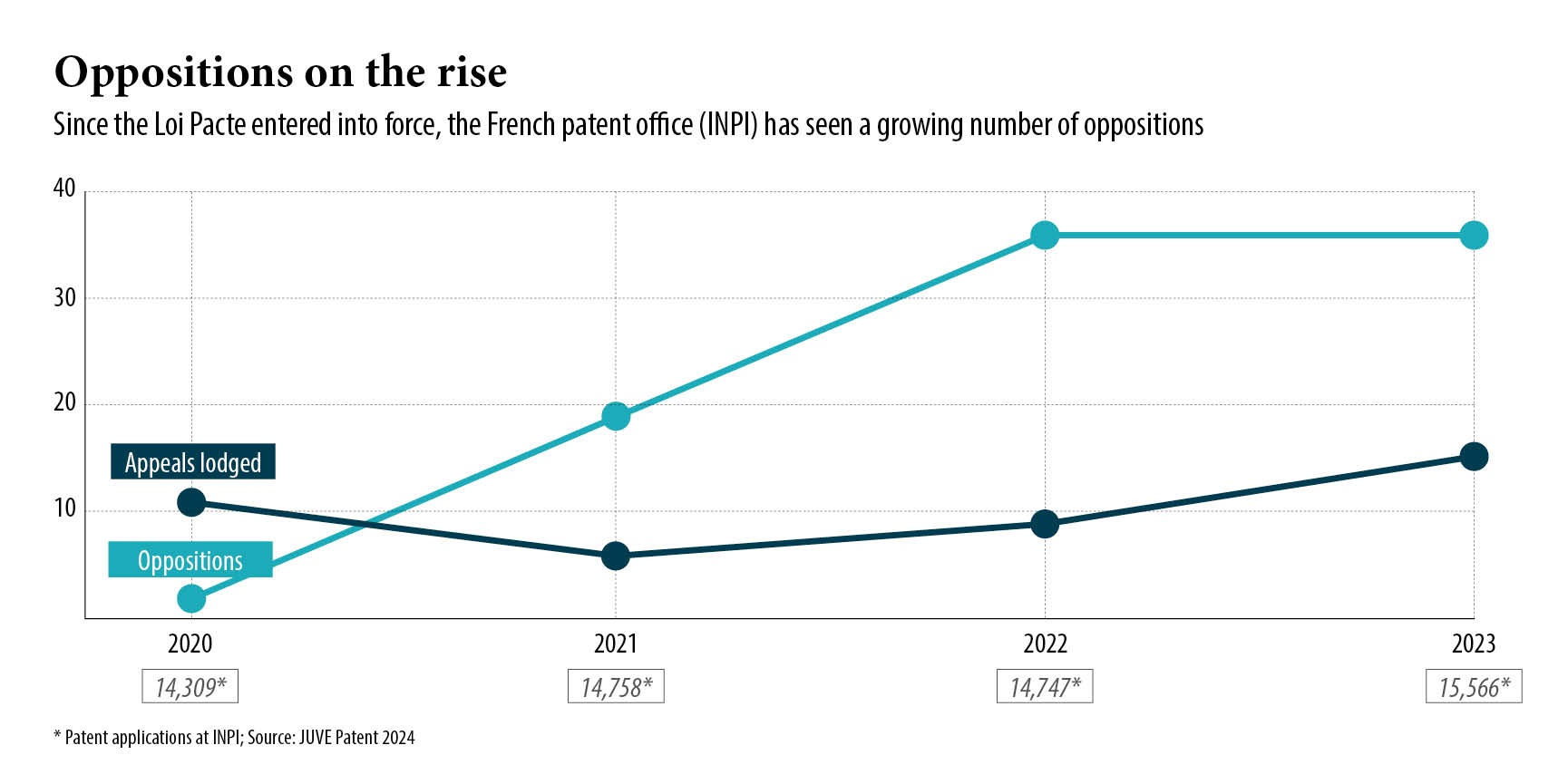Number of French patent cases remains an upwards trend
The number of new patent cases parties filed at the Judicial Court Paris rose during 2023, to over 3% higher than in the previous year. The development confirms a trend which has been ongoing for several years. At the same time, the French courts also saw numerous staff changes.
8 May 2024 by Konstanze Richter
For another consecutive year, the French court of first instance has recorded an increase in the number of new patent disputes, with the number rising from 180 in 2022 to 186 in 2023. The change, which marks a slight increase of 3.3%, continues the trend of recent years. In the same period, parties settled 198 patent proceedings, which is an increase of 5.3%. However, court statistics do not distinguish whether this was done by judgment, settlement or claim withdrawal.
Patent disputes continue to increase in importance for the Paris court’s chambers. While in 2021, patent proceedings accounted for 16% and in 2022 for 18% of all new cases, in 2023 this figure rose again slightly to 18.6%.
French patent cases settling
At the Paris Judicial Court, parties most frequently fight over infringement of European patents, which are the subject of 111 out of the 186 new lawsuits. Parties filed a further 38 lawsuits over the infringement of French national patents. Nullity suits and employee invention disputes comprise the remainder.
Although the judicial ranks of the 3rd Chamber were partly understaffed, France’s IP judges again concluded more cases than in the previous year. In 2022, the judges concluded 188 proceedings by judgment, withdrawal or settlement. However, in 2023, this number rose to 198. At the end of 2023, 203 patent disputes remained pending.
Counting method
Among observers, questions often arise regarding the manner in which the French courts count their cases. As Anne-Claire Le Bras, president of the 3rd chamber clarified to JUVE Patent in a recent interview, the court counts each case individually, i.e. per patent-in-suit and opposing party.
Le Bras said, “If a patent owner sues several parties on the basis of several patents, such as an originator against several generics manufacturers, each case is given its own file number and the court counts it as one procedure. This is also the case if, for example, the court decides on several proceedings relating to one and the same patent in one day.”

Full steam ahead
Since the beginning of 2024, the IP chamber of the court of first instance has been fully staffed again. In September 2023, Anne-Claire Le Bras succeeded Nathalie Sabotier as president of the 3rd chamber, while Sabotier moved to the Supreme Court (Cour de Cassation).
Le Bras was a judge at the Supreme Court’s Chambre Commerciale, which is responsible for IP, from 2001. There, she was primarily involved in disputes relating to trademark and competition law, but also gained experience in patent litigation. In 2021, she moved to the Paris Judicial Court, where she took responsibility for commercial leases and rents in the 18th chamber. She then assumed presidency of the 3rd chamber two years later.
Le Bras presides over the first section of the chamber, which also includes Elodie Guennec and Malik Chapuis. The second section under presiding judge Irène Benac also includes Arthur Courrion-Havy and Véra Zederman, who joined the IP chamber in January 2024. The third section now comprises presiding judge Jean-Christophe Gayet, and two judges Linda Boudour and Anne Boutron.
With nine judges across its three sections, the IP chamber now has full capacity to deal with the increasing number of proceedings. This is important, not least in view of the Olympic Games in Paris. Judges expect numerous additional PI proceedings or seizures, particularly in trademark and copyright law.
French oppositions on the rise
At the Paris Court of Appeal’s two chambers of the 5th department, which are responsible for IP matters, six judges are on the bench. In addition to presiding judge Isabelle Douillet, judgs Françoise Barutel and Deborah Bohee sit in the 1st chamber to hear IP disputes. In the 2nd chamber, presiding judge Veronique Renard, as well Laurence Lehmann and Agnes Marcadé, also conduct patent proceedings. A recent example is in the high-profile dispute between Intellectual Ventures and numerous network operators and mobile phone manufacturers.
Some of the court of appeal’s patent proceedings involve appeals against decisions by the French Patent Office (INPI), where the office has decided not to grant a patent. Since the introduction of the Loi Pacte 2020, which also allows oppositions at the INPI, the office now allows appeals against the resulting revocation of patents.
INPI figures show that the number of oppositions has increased significantly over the past four years. While parties filed two oppositions in 2020, parties filed 36 oppositions in 2023. However, their impact on appeal numbers is so far limited. In total, the INPI recorded 15 appeals against one of its decisions last year, only slightly more than the eleven appeals in 2020 when the Loi Pacte came into force.

Growing legal questions
However, the Loi Pacte also introduced the INPI’s examination of inventive step. This has given rise to a number of new legal questions, which are now finding their way to the Supreme Court.
In an interview with JUVE Patent, Nathalie Sabotier said, “We are noticing that the court is receiving an increasing number of inquiries on patent issues.” Following her move, the Commercial Chamber at the highest French court now has three female lawyers experienced in IP among its judges. These are Nathalie Sabotier, Pascale Tréfigny and Mélanie Bessaud.
As a former judge of the 3rd chamber of the Judicial Court, Bessaud has many years of experience in IP disputes. In addition to her work at the Supreme Court, the UPC chose her as a judge, a position she has held since June 2023. Bessaud told JUVE Patent, “This experience of accompanying both national and international proceedings is very enriching.”
Opportunity for harmony
Sabotier and Bessaud also hope that the UPC will provide impetus for national case law. Sabotier says, “The experience with the UPC can help to further develop the existing national system. Why shouldn’t we also involve technical judges in patent proceedings in France, for example?”
The French Supreme Court’s recent decisions already suggest a trend towards harmonisation with European patent case law. For example, when it applies judgments from the CJEU, as in demonstrated in the disputes between the INPI and Dana Faber, Ono Pharmaceuticals and Wyeth concerning SPCs. It has also referred to EPO practice, such as in the Kubota vs. INPI case concerning when parties may file a divisional patent based on a previous divisional application.
According to Sabotier and Bessaud, looking at case law beyond national borders will only grow in importance. Especially, as Bessaud says, “If the development of software and AI brings many fundamental legal issues in patent law to the Cour de Cassation.”